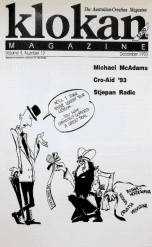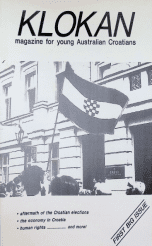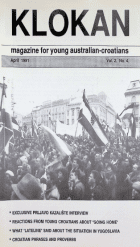As the children and grandchildren of Croatian immigrants, a lot of us have incredibly deep connections to our heritage through different forms. Whether that be through sport, music, cooking or journalism, there are so many options for all of us. From a journalistic perspective, there has been considerable growth and evolution within the Australian Croatian community over the past three decades. Before there were various social media accounts covering Croatian related content, there were limited news outlets for Croatian/Australian topics. Shortly after the Vjesnik took off, the ‘Klokan’ was established in the early 90s.

‘Klokan’ (which translates to Kangaroo in English) was a magazine for young Australian-Croatians. Published in English, its objective was to highlight issues experienced by the Croatian community in Australia, especially during that period just prior to the war of independence in the early 90s.
The contents of this magazine included interviews with Croatian celebrities such as Prljavo Kazaliste, reporting on political issues and outcomes in Croatia to keep Australians up to date with these topics, various comics and much more. By reporting on these issues, particularly during the 90s, Croatians living in Australia were able to maintain that relationship with their homeland, whilst also being given the opportunity to educate themselves and be more involved with issues that were current at the time.

The ‘Klokan’ played a crucial role in bridging the gap between the Croatian community in Australia and the ongoing political and cultural developments in Croatia, particularly during such a pivotal moment in history.
This connection that was created with our homeland eased difficult times, given that tensions were building in Croatia leading up to its independence. Keeping the community informed of these issues ensured our cultural identity was preserved, solidarity was established, opportunities for advocacy were created, and protected the rights of the community whilst simultaneously adapting to change which led to the growth of Croatian journalism in Australia.

The need to engage with first-generation Croatians in English was recognised by the founders of ‘Klokan’, as well as by non-Croatians with an interest in or connection to Croatian culture. Although it is not being published anymore, the spirit and intention behind the ‘Klokan’ is prominent within the Vjesnik. The pioneering first-generation Croatians who laid the foundation for the ‘Klokan’ have now joined forces with their second generation counterparts to continue the legacy through the publication of the Vjesnik. This honours the past, whilst enriching the future for generations to come.
